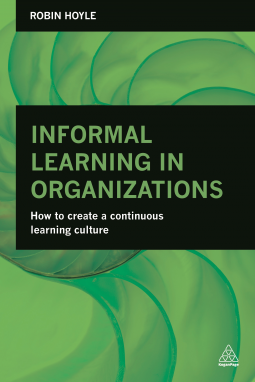
Informal Learning in Organizations
How to Create a Continuous Learning Culture
by Robin Hoyle
This title was previously available on NetGalley and is now archived.
Send NetGalley books directly to your Kindle or Kindle app
1
To read on a Kindle or Kindle app, please add kindle@netgalley.com as an approved email address to receive files in your Amazon account. Click here for step-by-step instructions.
2
Also find your Kindle email address within your Amazon account, and enter it here.
Pub Date 3 Sep 2015 | Archive Date 30 Nov 2015
Kogan Page Ltd | Kogan Page
Description
As the pace of change in the workplace accelerates and training budgets are challenged, it becomes essential for employees to learn as they go along. In this connected world, new ways of learning are emerging all of the time, whether the learning is planned, unexpected or self-directed. For those responsible for learning and development in organizations, understanding how this kind of informal learning can be utilised and measured is key to providing efficient and cost-effective ways of delivering on organizational objectives around people development.
Informal Learning in Organizations offers practical tools, including checklists and action plan questions, to guide the Learning and Development practitioner in how to design and implement an informal learning strategy that is personalised to the needs of their own organization. It combines the latest thinking on new technology and practices with established theory and research to provide an evidence-based review of informal learning and its true impact. It offers an overview of how and why informal learning resonates with people, how it works and when and why it doesn't. This book will assist the reader in making sense of their connected environments to create a continuous learning culture in their organizations.
Advance Praise
Colin Steed FLPI, Chief Executive, Learning and Performance Institute
Available Editions
| EDITION | Other Format |
| ISBN | 9780749474591 |
| PRICE | £29.99 (GBP) |
Links
Average rating from 7 members
Featured Reviews
 Sylvie Marie H, Reviewer
Sylvie Marie H, Reviewer
Robin Hoyle's book, Informal Learning in Organizations: How to Create a Continuous Learning Culture, published last September, clearly points out that informal learning is learning outside of formal learning structure such as classroom training or online e-learning modules. However, it is not necessarily self-directed, and it is fully informed by the needs of the organization for competency development and performance improvement. The objective is to increase the capability of the individual, the team, the organization.
The author also cautions the reader about the current hype in use of social media to support learning and focuses on the fundamentals of integrating learning with work and finding simple yet effective ways to measure outcomes. Organizations often give up on measuring learning outcomes, especially with informal learning. It is difficult without a measurement of outcomes, to make a good business case for investing in learning, whether formal or informal.
This book is practical, straight to the point, and provides clear examples. I recommend it to all learning and development specialist who are struggling with integrating informal learning in their learning strategies.



